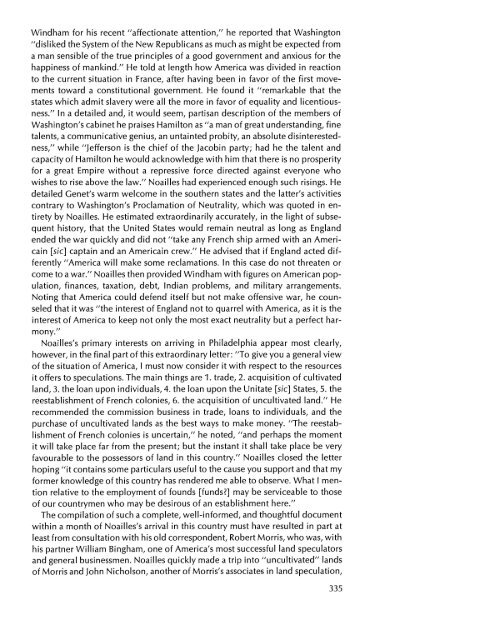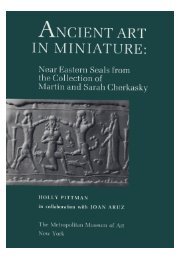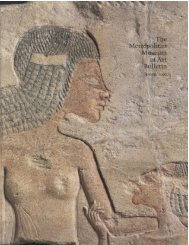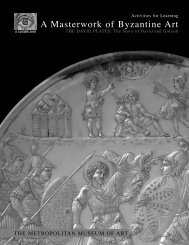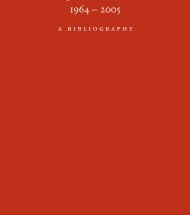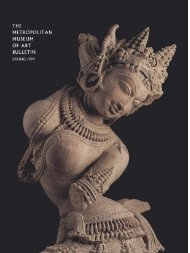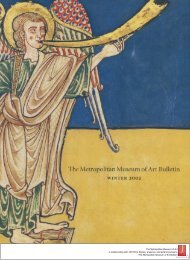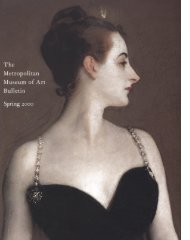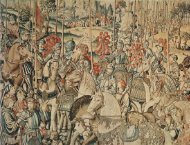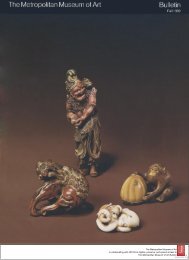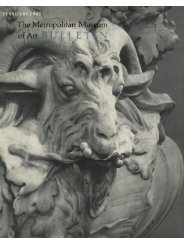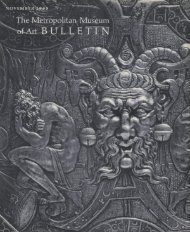The Metropolitan Museum of Art Bulletin, v. 29, no. 7 (March, 1971)
The Metropolitan Museum of Art Bulletin, v. 29, no. 7 (March, 1971)
The Metropolitan Museum of Art Bulletin, v. 29, no. 7 (March, 1971)
Create successful ePaper yourself
Turn your PDF publications into a flip-book with our unique Google optimized e-Paper software.
Windham for his recent "affectionate attention," he reported that Washington<br />
"disliked the System <strong>of</strong> the New Republicans as much as might be expected from<br />
a man sensible <strong>of</strong> the true principles <strong>of</strong> a good government and anxious for the<br />
happiness <strong>of</strong> mankind." He told at length how America was divided in reaction<br />
to the current situation in France, after having been in favor <strong>of</strong> the first movements<br />
toward a constitutional government. He found it "remarkable that the<br />
states which admit slavery were all the more in favor <strong>of</strong> equality and licentiousness."<br />
In a detailed and, it would seem, partisan description <strong>of</strong> the members <strong>of</strong><br />
Washington's cabinet he praises Hamilton as "a man <strong>of</strong> great understanding, fine<br />
talents, a communicative genius, an untainted probity, an absolute disinterestedness,"<br />
while "Jefferson is the chief <strong>of</strong> the Jacobin party; had he the talent and<br />
capacity <strong>of</strong> Hamilton he would ack<strong>no</strong>wledge with him that there is <strong>no</strong> prosperity<br />
for a great Empire without a repressive force directed against everyone who<br />
wishes to rise above the law." Noailles had experienced e<strong>no</strong>ugh such risings. He<br />
detailed Genet's warm welcome in the southern states and the latter's activities<br />
contrary to Washington's Proclamation <strong>of</strong> Neutrality, which was quoted in entirety<br />
by Noailles. He estimated extraordinarily accurately, in the light <strong>of</strong> subsequent<br />
history, that the United States would remain neutral as long as England<br />
ended the war quickly and did <strong>no</strong>t "take any French ship armed with an Americain<br />
[sic] captain and an Americain crew." He advised that if England acted differently<br />
"America will make some reclamations. In this case do <strong>no</strong>t threaten or<br />
come to a war." Noailles then provided Windham with figures on American population,<br />
finances, taxation, debt, Indian problems, and military arrangements.<br />
Noting that America could defend itself but <strong>no</strong>t make <strong>of</strong>fensive war, he counseled<br />
that it was "the interest <strong>of</strong> England <strong>no</strong>t to quarrel with America, as it is the<br />
interest <strong>of</strong> America to keep <strong>no</strong>t only the most exact neutrality but a perfect harmony."<br />
Noailles's primary interests on arriving in Philadelphia appear most clearly,<br />
however, in the final part <strong>of</strong> this extraordinary letter: "To give you a general view<br />
<strong>of</strong> the situation <strong>of</strong> America, I must <strong>no</strong>w consider it with respect to the resources<br />
it <strong>of</strong>fers to speculations. <strong>The</strong> main things are 1. trade, 2. acquisition <strong>of</strong> cultivated<br />
land, 3. the loan upon individuals, 4. the loan upon the Unitate [sic] States, 5. the<br />
reestablishment <strong>of</strong> French colonies, 6. the acquisition <strong>of</strong> uncultivated land." He<br />
recommended the commission business in trade, loans to individuals, and the<br />
purchase <strong>of</strong> uncultivated lands as the best ways to make money. "<strong>The</strong> reestablishment<br />
<strong>of</strong> French colonies is uncertain," he <strong>no</strong>ted, "and perhaps the moment<br />
it will take place far from the present; but the instant it shall take place be very<br />
favourable to the possessors <strong>of</strong> land in this country." Noailles closed the letter<br />
hoping "it contains some particulars useful to the cause you support and that my<br />
former k<strong>no</strong>wledge <strong>of</strong> this country has rendered me able to observe. What I mention<br />
relative to the employment <strong>of</strong> founds [funds] may be serviceable to those<br />
<strong>of</strong> our countrymen who may be desirous <strong>of</strong> an establishment here."<br />
<strong>The</strong> compilation <strong>of</strong> such a complete, well-informed, and thoughtful document<br />
within a month <strong>of</strong> Noailles's arrival in this country must have resulted in part at<br />
least from consultation with his old correspondent, Robert Morris, who was, with<br />
his partner William Bingham, one <strong>of</strong> America's most successful land speculators<br />
and general businessmen. Noailles quickly made a trip into "uncultivated" lands<br />
<strong>of</strong> Morris and John Nicholson, a<strong>no</strong>ther <strong>of</strong> Morris's associates in land speculation,<br />
335


